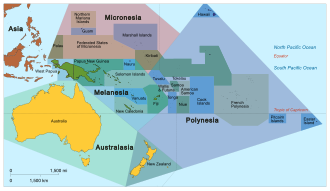Australasia
Topic: Place
 From HandWiki - Reading time: 12 min
From HandWiki - Reading time: 12 min

Australasia is a subregion of Oceania, comprising Australia , New Zealand and some neighbouring islands in the Pacific Ocean. The term is used in a number of different contexts, including geopolitically, physiogeographically, philologically, and ecologically, where the term covers several slightly different but related regions.
Derivation and definitions

Charles de Brosses coined the term (as French Australasie) in Histoire des navigations aux terres australes[1] (1756). He derived it from the Latin for "south of Asia" and differentiated the area from Polynesia (to the east) and the southeast Pacific (Magellanica).[2]
In the late 19th century, the term Australasia was used in reference to the "Australasian colonies". In this sense it related specifically to the British colonies south of Asia: New South Wales, Queensland, South Australia, Tasmania, Western Australia, Victoria (i.e., the Australian colonies) and New Zealand.[3] Australasia found continued geopolitical attention in the early 20th century. Historian Hansong Li finds that against the backdrop of British colonialism, German geopoliticians considered "Australasia" as a counterweight to the former German South Sea Edge (Südseerand), both of which form the "Indo-Pacific" region.[4]
The New Zealand Oxford Dictionary gives two meanings of "Australasia". One, especially in Australian use, is "Australia, New Zealand, New Guinea, and the neighbouring islands of the Pacific". The other, especially in New Zealand use, is just Australia and New Zealand.[5]
Two Merriam-Webster dictionaries online (Collegiate and Unabridged) define Australasia as "Australia, New Zealand, and Melanesia". The American Heritage Dictionary online recognizes two senses in use: one more precise, being similar to the aforementioned senses,[clarification needed] and the other broader, loosely covering all of Oceania.
Demographics
| Arms | Flag | Name of region, followed by countries | Area (km2) |
Population (2018)[6][7] |
Population density (per km2) |
Capital | ISO 3166-1 |
|---|---|---|---|---|---|---|---|
| Australasia | |||||||
| Template:Country data Ashmore and Cartier Islands | Ashmore and Cartier Islands (Australia) | 199 | |||||
| Australia | 7,686,850 | 24,898,152 | 3.1 | Canberra | AU | ||
| Christmas Island (Australia) | 135 | 1,692 | 12.5 | Flying Fish Cove | CX | ||
| Template:Country data Cocos (Keeling) Islands | Cocos (Keeling) Islands (Australia) | 14 | 593 | 42.4 | West Island | CC | |
| Template:Country data Coral Sea Islands | Coral Sea Islands (Australia) | 10 | 4 | 0.4 | |||
| New Zealand | 268,680 | 4,743,131 | 17.3 | Wellington | NZ | ||
| Norfolk Island (Australia) | 35 | 2,302 | 65.8 | Kingston | NF | ||
| Australasia (total) | 7,955,923 | 29,645,874 | 3.7 | ||||
See also
- All pages with titles beginning with Place:Australasia
- Asia-Pacific
- Australasian realm
- Australasia Olympics
- Austral-Asia Cup
- Down Under
- Sundaland
- Trans-Tasman
- Zealandia
References
- ↑ de Brosses, Charles (1756) (in fr). Histoire des navigations aux terres Australes. Contenant ce que l'on sçait des moeurs & des productions des contrées découvertes jusqu'à ce jour; & où il est traité de l'utilité d'y faire de plus amples découvertes, & des moyens d'y former un établissement. Paris: Durand. https://books.google.com/books?id=o3x_MaYZVJQC. Retrieved 2013-12-08.
- ↑ Douglas, Bronwen (2014). Science, Voyages, and Encounters in Oceania, 1511-1850. Palgrave Macmillan. p. 6.
- ↑ Lee, Joseph (1889). "Anti-Chinese Legislation in Australasia". The Quarterly Journal of Economics 3 (2): p. 220. doi:10.2307/1879468. https://www.jstor.org/stable/1879468.
- ↑ Li, Hansong (2021). "The "Indo-Pacific": Intellectual Origins and International Visions in Global Contexts". Modern Intellectual History 19 (3): 20–23. doi:10.1017/S1479244321000214. https://scholar.harvard.edu/files/hansongli/files/li_hansong-the-indo-pacific-intellectual-origins-and-international-visions-in-global-contexts.pdf. Retrieved 30 July 2022.
- ↑ Deverson, Tony; Kennedy, Graeme, eds (2005). "Australasia". New Zealand Oxford Dictionary. Oxford University Press. doi:10.1093/acref/9780195584516.001.0001. ISBN 9780195584516.
- ↑ ""World Population prospects – Population division"". United Nations Department of Economic and Social Affairs, Population Division. https://population.un.org/wpp/.
- ↑ ""Overall total population" – World Population Prospects: The 2019 Revision" (xslx). United Nations Department of Economic and Social Affairs, Population Division. https://population.un.org/wpp/Download/Files/1_Indicators%20(Standard)/EXCEL_FILES/1_Population/WPP2019_POP_F01_1_TOTAL_POPULATION_BOTH_SEXES.xlsx.
- Richards, Kel (2006). "Australasia". Wordwatch. ABC News Radio. http://www.abc.net.au/newsradio/txt/s1587644.htm.
External links
| Wikisource has the text of the 1911 Encyclopædia Britannica article Australasia. |
[ ⚑ ] 28°06′32″S 146°18′00″E / 28.10889°S 146.3°E
 |
 KSF
KSF